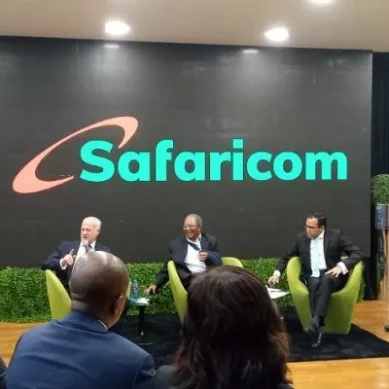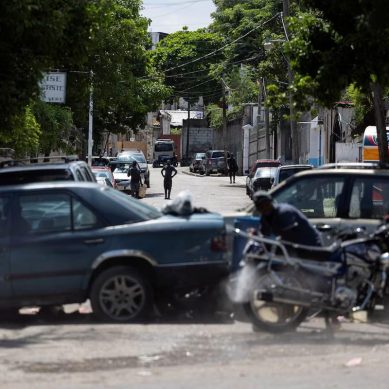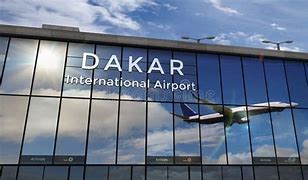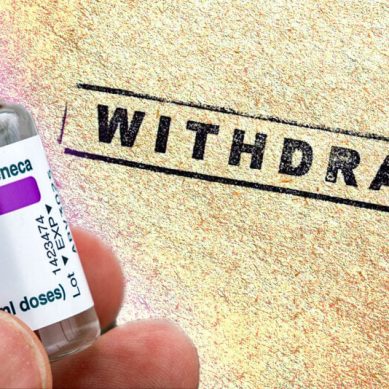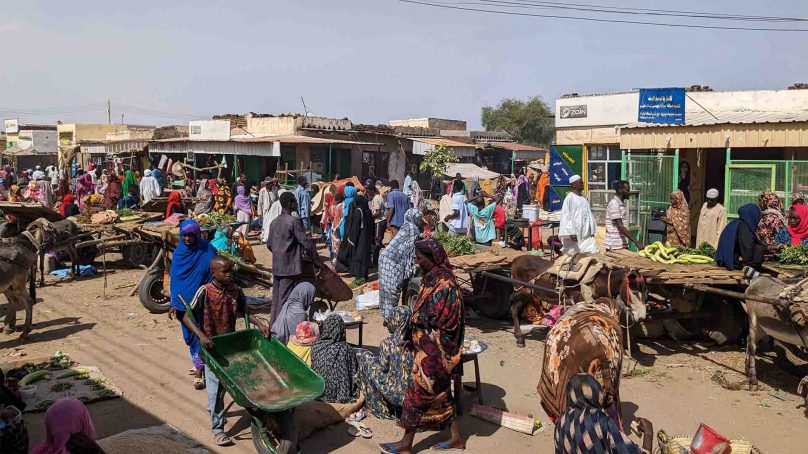
The sound of explosions and gunfire had rocked our neighbourhood for weeks, confining us inside and sending children scurrying under their beds. Then the inevitable happened: A shell ripped through the lightweight iron-sheet roof of my family home.
My eight-year-old nephew Muhanad was sitting on his mother’s lap when the shell landed in our living room, barely making a sound. It sliced through his head and opened up a large wound that came painfully close to killing him.
Stories like this are commonplace in Nyala, the largest city in Sudan’s Darfur region and the place I am from. Like much of Darfur, it has been destroyed by the war that broke out in April between the army and the paramilitary Rapid Support Forces.
I am a journalist and human rights defender who has spent years documenting conflict in Darfur. But nothing prepared me for what it feels like to see my city looted, to see my relatives and friends killed, to see my neighbours lose their jobs and slowly starve.
I have learnt that the impact of war is not just about death and destruction. It is about the damage it does to your sense of agency: the way it makes you feel powerless; the way it makes you feel like there is nothing that you can do to make things better.
When my nephew was hit, we took him to a local hospital only to find that all of the doctors had fled and that they didn’t even have a bed for him to lie on. We sat for hours with a bandage trying to stem the blood. We felt totally helpless.
Later in the day, we went to one of the few private hospitals that was still open, but they charged us thousands of dollars for surgery. We managed to raise the funds but other families that walked in with dying relatives did not.
Last month, I left Darfur because there were risks to me staying put given my work, but the sense of powerlessness has only gotten worse. Every time I receive a message or a missed call from my family, I worry something may have happened.
Still, my powerlessness is balanced by pride: pride in the local initiatives that have sprung up in my town to support those affected by the war, and pride in the knowledge that although Nyala has been destroyed, we will build it back again.
I personally will never give up the fight for justice in Darfur. I will not stop documenting crimes and calling for an end to impunity. I will always seek to bring attention to what is happening in my region. The next generation deserves nothing less.
I was born in 1985, just a few years before our autocratic former president, Omar al-Bashir, took charge in a military coup. He went on to hold power for three decades and terrorised Darfuris in the process.
I was at secondary school in 2003 when war broke out in Darfur. Rebels from mostly non-Arab groups rebelled against al-Bashir’s government, citing marginalisation. Al-Bashir responded by arming Darfuri Arab militias known as Janjaweed.
Those militias displaced millions of Darfur’s non-Arab groups and then took over their land. They later morphed into the Rapid Support Forces (RSF) – the paramilitary group that is now battling the army elites that spawned them.
The current war broke out in Khartoum, but quickly spread to Darfur. In some areas, the RSF and allied Arab militias have launched attacks against non-Arabs – continuing what was started 20 years ago – although in cities like Nyala they are mainly fighting the army.
The first few weeks of the conflict in Nyala were the hardest. Burying relatives became one the main daily activities for people. You would hear artillery being fired by the army. Then you would get the news that somebody you knew had been cut into pieces.
On day one of the conflict, we lost a neighbour called Adam Musa. He was sitting on a chair 200 metres away from us when a stray shell struck his back. On day two, we lost one of our uncles – a local RSF commander called Issak.
I had my own brush with death in the second week of the war. I had travelled to the centre of Nyala to buy insulin for a diabetic neighbour. I arrived at a pharmacy safely, but on the way back, at around 11am, I was detained by a group of soldiers.
They accused me of being an RSF leader because of my skin colour and my Arab tribal origins. “You Arabs, you militias,” they cursed, as they tied my hands behind my back, pushed me to the ground, and fired three live rounds close to my head.
Eventually, a commander showed up, accepted the validity of my press card, and apologised for what had happened. He told me this wasn’t the official behaviour of the army, but I avoided areas with soldiers from that point onwards.
In these first few weeks, I would often find adults breaking down and crying at random moments. In my house, there was a feeling that we were going to die, that we had no chance to survive.
And if the fear of being struck by a shell or caught in crossfire wasn’t enough, we soon began contending with another horror: RSF-aligned Arab militias in civilian clothes that scoot around on motorbikes, looting everything of value.
The presence of the militias echoes scenes from the 2003 Darfur conflict. Back then, Janjaweed fighters would raid villages on horseback, plundering livestock and household goods. The difference now is that the militias are targeting big cities.
The impact on Nyala has been devastating: The militias and RSF fighters have looted government ministries, and they have pillaged hospitals, markets, people’s shops and houses, and the offices of international aid agencies.
